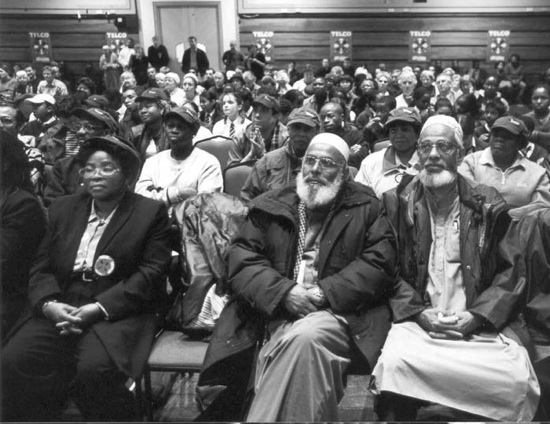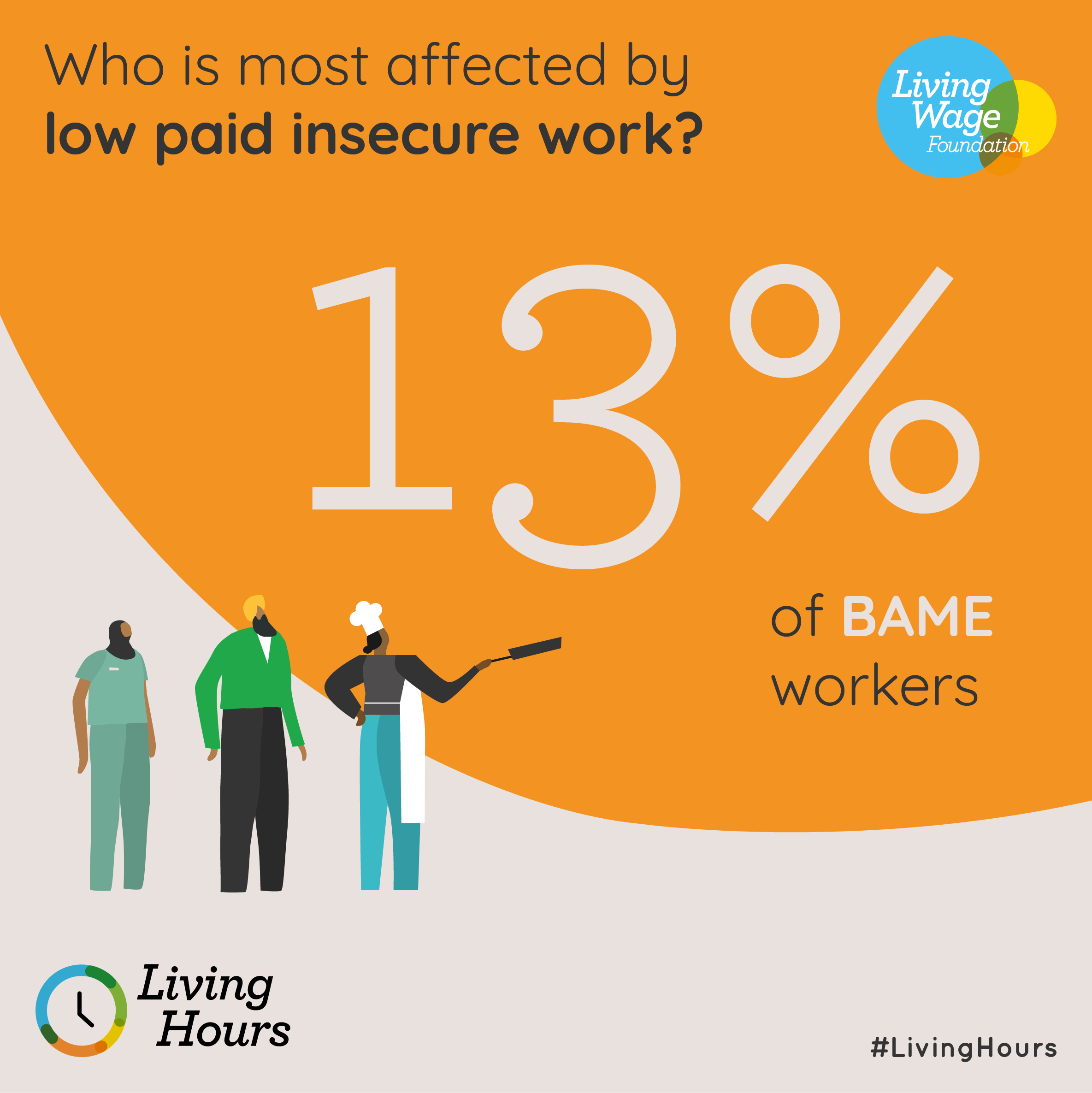Written by Co-Chairs of the Anti-Racism Working Group at the Living Wage Foundation
This year, during Black History Month, and after 20 years of the Living Wage campaign, it feels right to reflect on the achievements of the campaign and the workers from racialised communities that drove the campaign and called for a Living Wage. But it’s also right we continue to look at how we as an organisation can embody the spirit of those workers and do better.
Our movement’s roots
In 2001, the Living Wage campaign was born in East London- a movement established by low paid workers, largely from racialised communities, who were stuck doing multiple jobs on low pay, and struggling to make ends meet - people like Abdul Durrant; the Black British Muslim man who worked nights as a cleaner at HSBC’s headquarters in Canary Wharf, who every evening cleaned the offices of the Chairman who earned £2 million a year, whilst he himself earned only £4.50 per hour. Having connected with others to buy shares, Abdul came not as a cleaner, but as a shareholder to the company’s AGM and nervously stood up in front of all the investors and executives to say to the Chairman “We work in the same office, but we live in different worlds. Let me tell you what it’s like to work on £4.50 an hour and bring up six children.” Within 18 months, HSBC and other major banks signed up to pay a Living Wage. Twenty years on the campaign has seen almost 300,000 workers get a pay-rise and has put £1.5bn back into the pockets of low-paid workers – none of this would have been possible without the brave people like Abdul who first drove this campaign.

Throughout history, people from racialised communities have frequently led campaigns for better pay and conditions at work. A recent example is last year’s coordinated strikes by workers at fast-food restaurant chains in 15 cities around the US, demanding increases in their pay. However, despite the successes of many of these campaigns, including the campaign for a Living Wage, people from racialised communities remain far more likely to be trapped in temporary and insecure work, which has a huge impact on their living standards and life chances.
Low-pay disproportionately affects racialised communities
The Living Wage Foundation exists to tackle in-work poverty and we know that racialised communities are more likely to be restricted by poverty’s grip, and this can’t be easily explained away without considering the impact of racism. Our reading of data and research tells us that racial inequalities and discrimination unfortunately remain powerful forces in our labour market, and so are central considerations in the work we do promoting the real Living Wage. While there is evidence of progress in certain areas, such as educational outcomes for some racialised groups, it is incorrect to conclude that convergence and improvement for racialised communities are the whole story.
This is set out clearly by LSE economists Alan Manning and Rebecca Rose, who show, for example that pay gaps for different racialised groups (disaggregated by gender and ‘controlling’ for an appropriate set of characteristics) are often large, and that most haven’t narrowed in the past 25 years.1 Our own analysis shows that 13% of BAME workers are in low paid and insecure work – such as being under-employed, zero hours contracts, or having volatile pay and hours, compared to 10% of white workers.2 Racialised communities are more likely than their white counterparts to experience insecurity at work.

Runnymede Trust research also shows racialised workers are consistently more likely to have lost income through Covid-19 than white workers. Bangladeshi (43%) followed by Black African groups (38%) were the most likely to report the loss of some income since COVID-19, compared with 21% of Black Caribbean groups and 22% of white British people.3 Understanding the scale of the problem is one thing, but we cannot expect to see positive change if we do not evolve our own organisation and continue to hold a mirror up to ourselves. Black History Month is an important moment for organisations to listen, learn and reflect but the work must happen all year round.
What we’re doing
At the Living Wage Foundation, we know we cannot be an anti-poverty organisation without also being an anti-racist one, and we are committed to standing in solidarity with racialised communities facing prejudice. To us, solidarity means respecting, listening, supporting and acting. We will continue working with our growing network of nearly 9,000 accredited Living Wage Employers this year, in partnership with experts on race and racism, to understand the role of the Living Wage in tackling racial inequalities, and what more the Living Wage community must do.
Further work we will continue to pursue includes economic analysis, evidence-gathering from employers and in-depth conversations across a selection of organisations. The building up of evidence is intended as a starting point, with the ultimate aim being to use our evidence to engage employers on how low pay impacts those from racialised communities and how we effectively reduce the various employment gaps these workers face. We plan to bring this work together in a summary report, including recommendations, early next year. You can still get involved in our Action-Research here.
The anti-racism research is intended to support the Living Wage Foundation to create an evidence base on the impact that paying the Living Wage has on racialised workers (and, potentially, how this links to broader representation issues at senior levels). The building up of an evidence base is intended as a starting point, with the ultimate aim being to use our evidence to engage with employers on how low pay impacts those from racialised communities and how we can effectively reduce the various employment gaps these workers face.
We have been working closely with our Anti-Racism Learning Group whose main purpose is to create a regular and formal space for education, learning, reflection and to feed into the strategic aim of the Living Wage Foundation to become an anti-racist organisation. You can find our Terms of Reference here. We’re a long way from achieving justice, but we’re committed to the responsibility we have and must be held accountable to by our staff, our network and our communities to tackle racism in its many forms.
What our Network is doing
There are plenty of things to celebrate our network for this Black History Month, like First Response Group, a Recognised Service Provider and Living Wage Champion Award winner winning the ‘Black Business Peoples of the Year Award’ at the Black British Business Awards, but also the organisations who are on an Anti-Racism journey and are using this time to hold themselves to account.
It’s been encouraging to see our network stepping up to tackle anti-racism and ensure diversity and inclusion. One of our Living Wage Employers, Herbert Smith Freehills has spoken on the work they have undertaken:
“We have been working to further diversify the make-up of their organisation: introducing ethnicity targets in some of our global offices. But we are always aware of the need to do more, and the growing prominence of the Black Lives Matter movement has, for many of us, served as a catalyst for deep reflection on the bias and racism that are rife within society.
We’ve had meaningful discussions with people across the firm about how we can become an anti-racist organisation, committed to confronting the deep-seated inequities and injustices from which no country or business is exempt. In September 2020, we launched our ‘10 Actions for Change’: a global set of commitments aimed at improving the representation, and experience, of Black, First Nations, Asian and minority ethnic colleagues throughout the firm. These actions include a commitment to address barriers to the recruitment, improve retention, deliver anti-racism workshops, invest in research and continue listening to our people. In addition to engaging externally with our clients, suppliers and communities”.
We know there is much more we need to do, not only to celebrate the history of racialised communities as drivers of the Living Wage campaign, but also to understand the continuing challenges they face, and how we can become a truly anti-racism organisation to widen and broaden the impact of our work. We’d love to hear from others in the network on what they’re doing to become an anti-racist organisation.
[1] Manning, A & Rose, R (2021) Ethnic Minorities and the UK Labour Market: Are Things Getting Better? London: London School of Economics, Centre for Economic Performance.
[2] Richardson, J (2021). The Insecurity Complex: Low paid workers and the rise of insecure work. London: Living Wage Foundation.
[3] Haque et al (2021) Over-Exposed and Under-Protected: The Devastating impact of Covid-19 on BAME communities in Great Britain. London: Runnymede Trust.
